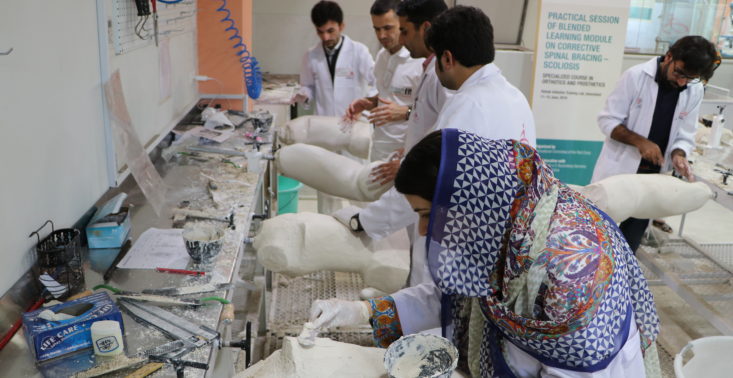Training for Prosthetists and Orthotists in Pakistan

The loss of a limb is one of the most traumatic experiences that a person can go through in life. The tragedy exacerbates when there is no access to rehabilitation services which enable persons to get out of the trauma and live their lives with dignity and independence. An inaccessible system for the rehabilitation of persons with physical disabilities, unfortunately, combined with a general unawareness about the existence of treatment for disabilities is just one the obstacles in the myriad of problems that tint the adequate provision of rehabilitation services in Pakistan.
Prosthetists and Orthotists (P&Os) are one of the most important healthcare workers in the continuum of physical rehabilitation. Once a person visits a physical rehabilitation center on account of a physical impairment (which could be due to congenital reasons or trauma/injury), P&O’s carefully assess the type and degree of physical disability and the associated pathologies for diagnosis. Upon diagnosis, the patient is prescribed an assistive device either in the form of a Prosthesis to replace the a lost limb, or an orthosis in case the disability requires external support and management of the existing body segment. P&Os play a very significant role in the recovery of the person with a disability, as they not only prescribe an assistive device but are also trained to custom-fabricate assistive devices for a wide spectrum of physical disabilities.
Despite their importance in the physical rehabilitation healthcare, not much is known about the services provided by them. To promote awareness about Prosthetists and Orthotists (P&Os), The Rehab Initiative in collaboration with the International Committee of the Red Cross (ICRC) and the Human Study e.V (Germany) organizes blended learning modules, which follow a mixed methodology of interactive e-learning, quizzes, hands-on training sessions, examination modules and follow-up case presentations. These courses are aimed at building professional and training capacities of P&OS in Pakistan by exposing them to advanced techniques and procedures. These trainings in the long-run will create awareness about prosthetics and orthotics among other health professionals and persons with disabilities and promote the sharing of best practices to fabricate quality prosthetic and orthotic devices for persons with disabilities.

I am interested in a short term training in all disciplines of P&O
Or any other training you offer.